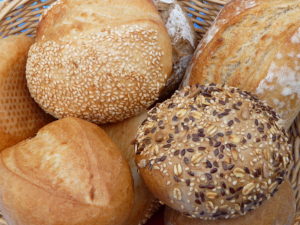 Another study has shown health benefits from eating a diet rich in whole grains, as compared to one with lots of refined grains (think bagels, muffins, white bread). Fifty overweight Danish adults were randomly assigned to either a group where all grains eaten were whole grains or a group where all grain products were of refined grains. They did this for 8 weeks, then ate their usual diet for a few weeks (the "washout period"), and then were assigned to the other dietary group for 8 weeks.
Another study has shown health benefits from eating a diet rich in whole grains, as compared to one with lots of refined grains (think bagels, muffins, white bread). Fifty overweight Danish adults were randomly assigned to either a group where all grains eaten were whole grains or a group where all grain products were of refined grains. They did this for 8 weeks, then ate their usual diet for a few weeks (the "washout period"), and then were assigned to the other dietary group for 8 weeks.
They found that eating the diet rich in whole grains resulted in: consuming fewer calories (the whole grains made them feel fuller), losing weight, and a decrease in chronic low-grade inflammation (by measuring blood inflammation markers). The whole grain rye seemed to be especially beneficial. But interestingly, the researchers found that the whole grain diet did not significantly change the gut microbe composition. But they did find that 4 strains of Faecalibacterium prausntzii and one of Prevotella copri increased in abundance after whole grain and decreased after refined grain consumption. F.prausnitzii is a desirable and beneficial keystone species in the gut (here and here).
Other studies show that eating a diet rich in whole grains (rather than refined grains) is associated with a decreased risk of several diseases, including type 2 diabetes and cardiovascular diseases. Bottom line: choose whole grains whenever possible. From Science Daily:
Several reasons why whole grains are healthy
When overweight adults exchange refined grain products -- such as white bread and pasta -- with whole grain varieties, they eat less, they lose weight and the amount of inflammation in their bodies decreases. These are some of the findings of a large Danish study headed by the National Food Institute, Technical University of Denmark.
The study included 50 adults at risk of developing cardiovascular disease or type 2 diabetes. Blood tests showed that the participants had less inflammation in their bodies when eating whole grains. In particular, it appeared that rye had a beneficial effect on the blood's content of inflammatory markers. Inflammation is the natural response of the body to an infection, but some people have slightly elevated levels of inflammation (so-called low-grade inflammation) even though there is no infection. This is particularly the case in overweight people. In overweight people, an increased level of 'unnecessary' (subclinical) inflammation may lead to increased risk of developing type 2 diabetes.
The study also shows that participants eat less when whole grain products are on the menu -- presumably because whole grain consumption causes satiety. While eating the whole grain diet, participants have generally lost weight. The researchers used DNA sequencing to analyze stool samples from the participants in order to examine whether the different diet types affected the participants' gut bacteria composition. Overall, the analysis did not shown major effects of the dietary grain products on the composition of the gut bacteria. [Original study.]
